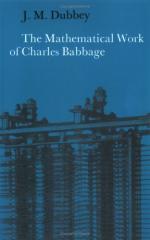|
This section contains 571 words (approx. 2 pages at 300 words per page) |

|
1791-1871
English Mathematician and Inventor
The development of the modern computer owes a debt to Englishman Charles Babbage, who developed plans for an analytical engine (the forerunner of today's digital computer) as early as the mid-1830s.
Born the day after Christmas in 1791 in London, England, Babbage entered the University of Cambridge around 1809. In 1812, he helped to organize Analytic Society as a means of introducing new theories emerging from other European countries into the British field of mathematics. He became well known for his creative organizational ideas and, in 1816, was elected a fellow of the Royal Society of London. He also founded Royal Astronomical (1820) and Statistical (1834) societies.
Around the time he was organizing the Analytic Society, Babbage came up with a concept far ahead of his time: a machine that could calculate various mathematical functions with an accuracy of upto eight decimals. Later, in 1823, he was...
|
This section contains 571 words (approx. 2 pages at 300 words per page) |

|


